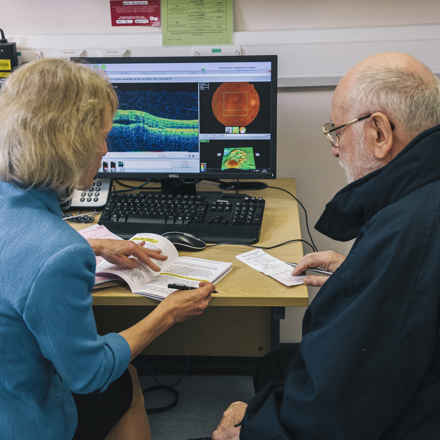Advice for eye injections
Posted: Tuesday 02 July 2024
Being told you need an injection in your eye can come as a shock to many people and may leave you feeling anxious and worried as you await the procedure, unsure of what to expect.
Brian, who has undergone 37 injections in one eye, talks through his experience, offering reassurance to others recently diagnosed with macular disease who need anti-VEGF injections.
Brian lost the sight in his left eye in 1992 but, since his right eye was still OK, he admitted that it didn’t really affect him.
He said: “How did I feel? I'm quite tough. And at the time you think, ‘well, at least it's not life threatening,’ or in my case, I've done 25 years working with people with MS.”
But in April 2018, he noticed blurred vision in his right eye and went straight to his opticians. Within 20 minutes, he was referred to his GP, who then directed him to Moorfields Eye Hospital where, due to only having sight in one eye, he was prioritised for treatment. He received his first injection within five days.
Despite being unable to drive and relying heavily on his wife to help him about the home, he remains resilient.
The 79-year-old hopes by sharing his experiences he can support others facing a diagnosis.
Reassurance from others
Brian’s first piece of advice is to seek reassurance from people who have been through a similar experience. He said: "I'll never forget just before my first injection, after I'd been told I had wet age-related macular degeneration (AMD), there was a man on YouTube saying, how having the injections was no ‘big deal’. He was older than me, probably about 85 and that gave me confidence.”
He added: “When I went for my first injection, I sat next to an older lady. Well, I'm quite old, but she was older. She had had 50 injections in one eye and 51 in the other. So I got chatting to her and that helped too, because when you look at someone and they're older and they've had a lot of injections, you think, ‘well, if they can do it, anyone can do it’.”
Trust the professionals
Brian also shared the importance of trusting the doctors and nurses at the hospital, who he said are more than used to administering the injections.
He said: “When it happened the first time, I thought it's just like a COVID injection in a way,” he said. “You’ve got to trust the professionals, because they're doing that all day and they know what they are doing.
Brian added: “It's important to remember that it’s just an injection.”
Advice for new patients
However, Brian said there are two options for new patients awaiting their first injection, depending on what works best for them.
He said: "There's two lines of thought: one is not to research and just turn up, the other is to do the homework, which I personally found helpful. Watching a YouTube video helped me, but it may not be for everyone.”
Emotional and practical support
Brian wanted to emphasise the importance of not driving after the injection, so having someone to take you home can be a huge help.
He said: "It would be helpful if you had someone with you for your injection. Having a support system is important. My family helps me get around, and having someone with you can ease the process.”
If you don’t have someone who can go with you, or are anxious about your first injection Macular Society treatment buddies offer telephone support and offer information and reassurance. To find out more you can contact our Helpline on 0300 3030 111 or email help@macularsociety.org
The injection process
Although each clinic will differ slightly, Brian’s injection experience at Moorfields always follows the same routine. He explained that the process begins with a sight test, followed by a scan and then a discussion with the consultant, before the injection itself.
After the injection, he said he usually experienced some floaters or distorted vision but that it was back to normal after a few days.
Talking about the injection procedure, he said: “A doctor, and or a nurse, will clean and anaesthetise your eye and put a small plastic mask above and below the eye that is being injected. The eye will then be injected. It is a quick and simple process.”
Brian shared his experience after encountering newly diagnosed patients in the clinic who are unaware of what to expect on their first visit.
He said: “When you go to the eye clinic and are waiting around you hear people come into the reception asking what it will be like.. So, I hope sharing my experiences might be helpful to someone.”
Do you have any tips for people experiencing injections for the first time?
We’d love to share your advice. Get in touch at stories@macularsociety.org
Macular Society treatment buddies
We can put you in touch with someone who’s had treatment for macular disease, to answer your questions and put your mind at rest.
Questions about injections
Eye injections might seem frightening, but they're usually painless. Discomfort or pain during or after an intravitreal injection should never be ignored - even if it's not a symptom of infection, there are ways to make the process less painful in the future.




